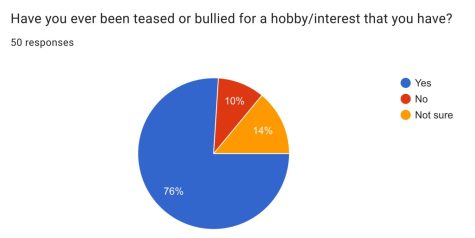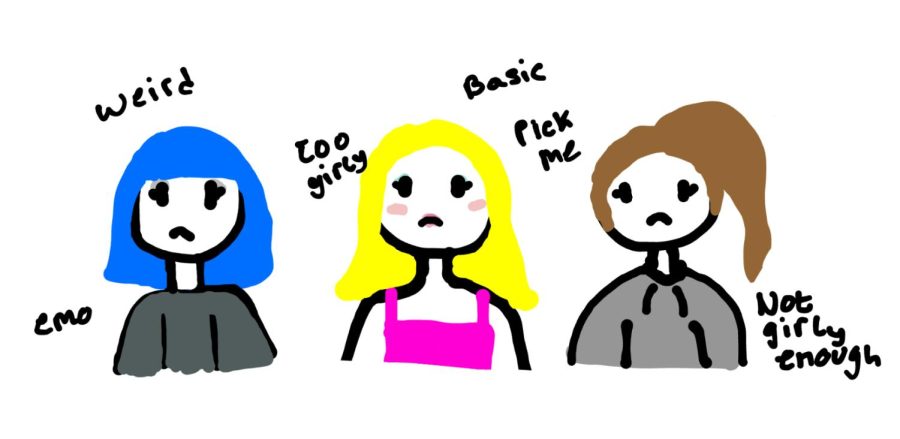The judgement of girls hobbies
If you wear leggings, hoodies, and like Starbucks, you’re basic and only like that stuff because it’s trendy. If you have an unnatural hair color, dress alternatively, and listen to underground music, you’re weird and trying too hard to be different. Do you like makeup and crop tops? Well, you just want male attention. Do you like video games and sports? Then, you also just want male attention.
With stereotypes like “pick me girls,” and phrases like “I’m not like other girls,” being thrown around on social media, hate on teen girls seems to be everywhere. Often times, hate has been passed around in schools like Norwin and society for decades, but has most definitely been amplified by social media
Out of 50 Norwin girls asked, 76 percent of them said they have experienced bullying because of something they like, and 14 percent said they were unsure if they ever experienced this.

Oftentimes, people tend to specifically attack teenage girls instead of teenage boys. You do not typically see guys getting made fun of for playing video games or doing sports. There surely are moments where things like that happen, but it is not as normalized as the hate on teen girls.
According to The Teen Magazine, “It’s almost as if the interests of boys and men are seen as inherently more valuable and interesting and better. The fields of sports, technology, geekdom and video games are seen as male-dominated. Fanboying over them isn’t considered obsessive or hysterical.”
A common way that girls get bullied is through nicknames and stereotypes. A more common phrase that has been more popularized recently is the term “pick me girls.”
The website Grazia Daily defines pick me girls as: “A ‘pick me girl’ is an evolution of the ‘cool girl’ – they seek male validation above all else, to the detriment of other women.“
This term refers to girls who make fun of and belittle other girls for the sake of male validation or to seem “cool.” However, male validation is not the only reason that girls belittle other girls.
In a poll of 50 Norwin girls, over half of the girls polled said that in their experience, girls tend to judge other girls because of “jealousy and their own insecurities.”
Girls may not feel comfortable and happy with their own hobbies and feel the need to project that onto other girls to make themselves feel better. The phrase “I’m not like other girls” has also been popularized recently. Girls who believe that they are more ‘quirky,’ or ‘unique’ than other girls say this. This seemingly harmless phrase has been causing unnecessary hate on girls for the last few years.
Elle.In states, “Let’s take a simple example, a significant other calls you ‘special’ because you’re different from the other girls. If ‘you’re not like other girls’ is a compliment, what does it say about ‘other girls?’ When a compliment explicitly states that someone is desirable because they aren’t like everyone else, isn’t that just saying everyone else is inferior to that person?”
However, girls are not the only ones using this phrase, men are too. In addition to that, boys are equally as guilty for the hate on teen girls.
In a poll of 50 Norwin girls, 28 percent said that boys are more critical of girls’ interests and 52 percent said that girls and boys are both equally as critical when it comes to this.
Oftentimes guys will judge girls when they enjoy something that is not viewed as conventionally attractive.
“I think that guys make fun of girls for what they like because they have certain opinions on what they find attractive,” said an anonymous female Norwin student. “For example, if they find a certain sport unattractive for a girl or ‘manly,’ they may judge that girl for having that certain hobby.”
The hate on girls is passed around in many different ways. One of the most common ways is through nicknames or stereotypes.
Over 90 percent of the 50 Norwin girls surveyed said that they have been called names because of their hobbies. Names and labels like, “weird” and “basic” came up most often. These names were most commonly said to be passed around through gossip and online comments.
Teenage girls can not catch a break from the judgement of others. When asked what they were made fun of for, Norwin girls’ responses ranged from liking things such as makeup and dresses, to doing Boy Scouts and enjoying video games. No matter what you like, whether it be feminine or masculine things, it seems as if someone will find a way to criticize you for it.







